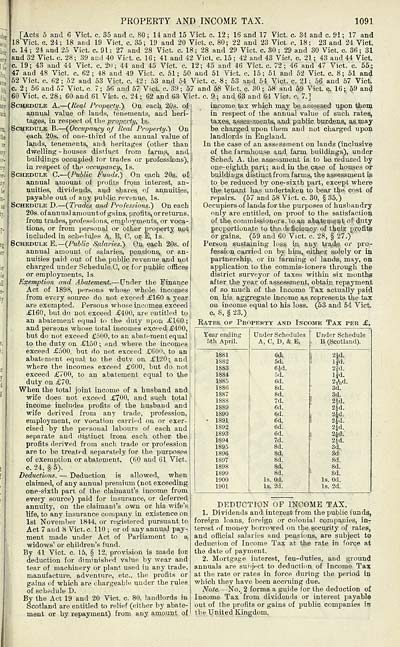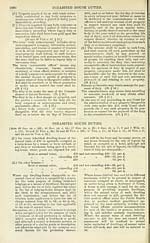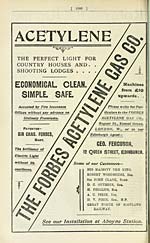Download files
Complete book:
Individual page:
Thumbnail gallery: Grid view | List view

PROPERTY AND INCOME TAX.
1091
[Acts 6 and 6 Vict. c. 35 aud c. 80 ; 14 and 15 Vict. c. 12 ; 16 and 17 Vict, c 34 and c. 91 ; 17 and
18 Vict. 0. 24; 18 and 19 Vict. c. 35; 19 and 20 Vict. c. 80; 22 and 23 Vict. c. 18; 23 and 24 Vict.
14; 24 and 25 Vict. c. 91: 27 and 28 Vict. c. 18; 28 and 29 Vict. c. 30 ; 29 and 30 Vict. c. 36; 31
and 32 Vict. c. 28; 39 an(i 40 Vict. c. 16; 41 and 42 Vict. c. 15 ; 42 and 43 Vict. c. 21 ; 43 and 44 Vict.
19; 43 aud 44 Vict. c. 2i); 44 and 45 Vict. c. 12; 45 and 46 Vict. c. 72; 46 and 47 Vict. c. 65;
47 and 48 Vict. c. 62; 48 and 49 Vict. c. 51; 50 and 51 Vii'.t. c. 15; 51 and 52 Vict. c. 8 ; 51 and
52 Vict. o. 62 ; 52 aud 53 Vict. c. 42 ; 53 and 54 Vict. c. 8 ; 53 and 54 Vict. c. 21 ; 56 aud 57 Vict.
2 ; 56 and 57 Vict. c. 7 ; 56 and 57 Vict. c. 39 ; 57 and 58 Vict. c. 30 ; 58 and 59 Vict. <?. 16 ;. 59 an4
60 Vict. c. 28 ; 60 and 61 Vict. c. 24 ; 62 and 63 Vict. c. 9 ; and 63 and 64 Vict. c. 7.]
Schedule A. — {Real Property.') On each, 20s. of
annual value of lands, tenements, and heri-
tages, in respect of the property, Is.
Sc^TEDULE B. — {Occupancy oj Real Property.') On
each 20s. of cue-third of the annual value of
laaids, tenements, and heritages (other than
dwelling-houses distinct from farms, and
buildings occupied tor trades or professions),
in respect of th." occupancy. Is.
Schedule C. — {Public Funds.) On each 20s, ofi
annual amount of profits from interest, an-
nuities, dividends, and shares of annuities,
payable out of any public revenue. Is.
Schedule D. — {Trades and Professions.) On each
20s. ofannual amount of gains, profits, or re turns.
from trades, profes.sions, employments, or voca-
tions, or from personal or other property B,ot
included in schedules A, B, C, or E, Is.
Schedule Y,.— {Public Salaries.) On each 20s. of
annual amount of salaries, pensions, or an-
nuities paid out of the public revenue and not
charged under Schedule 0, or for public offices
or employments. Is.
Exe.mption and Abatement. — [Jnder the Einance
Act of 1898, persons whose whole incomes
from every source do not exceed .£160 a year
are exempted. Persons whose incomes exceed
£160, but do not exceed £400, are entitled to
an abatement equal to the duty upon £160 ;
and persons whose total incomes exceed £400,
but do not exceed £500, to an abatement equal
to the duty on £150 ; wnd where the incomes
exceed £500, but do not exceed £600. to an
abatt-ment equal to the dutv on £120; and
where the incomes exceed £600, but do not
exceed £700, to an abatement equal to the
duty on £70.
When the total joint income of a husband and
wife does not exceed £700, and such total
income includes profits of the husband and
wife derived from any trade, profession,
employment, or vocation carried on or exer-
cised by the personal labours of each and
separate and distinct from each other the
profits derived from such trade or profession
are to be treated separately for the purposes
of exemption or abatement. (60 and 61 Vict.
c. 24, § 5).
Deductions. — Deduction is allowed, when
claimed, of any annual premium (not exceeding
one-sixth part of the claimant's income from
every source) paid for insurance, or deferred
annuity, on the claimant's own or his wife's
life, to any insurance company in existence on
1st November' 1844, or registered pursuant to
Act 7 and 8 Vict. c. 110 ; or of any annual pay-
ment made under Act of Parliament to a
widows' or children's fund.
By 41 Vict. c. 15, § 12, provision is made for
deduction for diminished value by wear and
tear of machinery or plant used in any trade,
manufacture, adventure, etc., the profits or
gains of which are chargeable under the rules
of schedule D.
By the Act 19 and 20 Vict. c. 80, landlords in
Scotland are entitled to relief (either by abate-
ment or by repayment) from any amount of
income tax which may be assessed upon them
in respect of the annual value of such rates,
taxes, assessments, aai,d piiblic burdjsns, as niay
be charged upon them and not charged tipon
landlords in England.
In the case of an assessment on lands (inclusive
of the farmhouse and farm buildings), under
Schedi A. the assessment is to be reduced by
one-eighth part; aud in the case of houses or
buildings distinct from farms, the assessment is
to be reduced by one-sixth part, except where
the tenant has undertaken to bear the cost of
repairs. (57 and 58 Vict. c. 30, § 35.)
Occupiers of lands for the purposes of husbandry
only are entitled, on proof to the satisfaction
of the commissioners, to an aba,tement of duty
proportionate to the deficiency of their pi-ofits
or gains. (59 and 60 Vict, c! 28, § 27.)
Person sustaining loss in any trad,e or pro-
fession carried on by him, either solely or in
partnership, or in farming of lands, may, on
application to the commisi-ioners through the
district surveyor of taxes within six months
after the year of assessment, obtain repayment
of so much of the Income Tax actually paid
on his aggregate income as represents the tax
on income equal to his loss. (53 and 54 Vict,
c. 8, § 23.)
Bates op Property and Income Tax per £.
DEDUCTION OF INCOME TAX.
1. Dividends and interest from the public funds,
foreign loans, foreign or colonial companies, in-
terest fif money borrowed on the security of rates,
and ofiScial salaries and pensions, are subject to
deduction of Income Tax at the rate in force at
the date of payment.
2. Mortgage interest, feu-duties, and ground
annuals are sui'ject to deductii>n of Income Tax
at the rate or rates in force during the period in
which they have been acci'uing due.
Note. — No. 2 forms a guide for the deduction of
Income Tax from dividends or interest payable
out of the profits or gains of public companies in
the United Kingdom.
1091
[Acts 6 and 6 Vict. c. 35 aud c. 80 ; 14 and 15 Vict. c. 12 ; 16 and 17 Vict, c 34 and c. 91 ; 17 and
18 Vict. 0. 24; 18 and 19 Vict. c. 35; 19 and 20 Vict. c. 80; 22 and 23 Vict. c. 18; 23 and 24 Vict.
14; 24 and 25 Vict. c. 91: 27 and 28 Vict. c. 18; 28 and 29 Vict. c. 30 ; 29 and 30 Vict. c. 36; 31
and 32 Vict. c. 28; 39 an(i 40 Vict. c. 16; 41 and 42 Vict. c. 15 ; 42 and 43 Vict. c. 21 ; 43 and 44 Vict.
19; 43 aud 44 Vict. c. 2i); 44 and 45 Vict. c. 12; 45 and 46 Vict. c. 72; 46 and 47 Vict. c. 65;
47 and 48 Vict. c. 62; 48 and 49 Vict. c. 51; 50 and 51 Vii'.t. c. 15; 51 and 52 Vict. c. 8 ; 51 and
52 Vict. o. 62 ; 52 aud 53 Vict. c. 42 ; 53 and 54 Vict. c. 8 ; 53 and 54 Vict. c. 21 ; 56 aud 57 Vict.
2 ; 56 and 57 Vict. c. 7 ; 56 and 57 Vict. c. 39 ; 57 and 58 Vict. c. 30 ; 58 and 59 Vict. <?. 16 ;. 59 an4
60 Vict. c. 28 ; 60 and 61 Vict. c. 24 ; 62 and 63 Vict. c. 9 ; and 63 and 64 Vict. c. 7.]
Schedule A. — {Real Property.') On each, 20s. of
annual value of lands, tenements, and heri-
tages, in respect of the property, Is.
Sc^TEDULE B. — {Occupancy oj Real Property.') On
each 20s. of cue-third of the annual value of
laaids, tenements, and heritages (other than
dwelling-houses distinct from farms, and
buildings occupied tor trades or professions),
in respect of th." occupancy. Is.
Schedule C. — {Public Funds.) On each 20s, ofi
annual amount of profits from interest, an-
nuities, dividends, and shares of annuities,
payable out of any public revenue. Is.
Schedule D. — {Trades and Professions.) On each
20s. ofannual amount of gains, profits, or re turns.
from trades, profes.sions, employments, or voca-
tions, or from personal or other property B,ot
included in schedules A, B, C, or E, Is.
Schedule Y,.— {Public Salaries.) On each 20s. of
annual amount of salaries, pensions, or an-
nuities paid out of the public revenue and not
charged under Schedule 0, or for public offices
or employments. Is.
Exe.mption and Abatement. — [Jnder the Einance
Act of 1898, persons whose whole incomes
from every source do not exceed .£160 a year
are exempted. Persons whose incomes exceed
£160, but do not exceed £400, are entitled to
an abatement equal to the duty upon £160 ;
and persons whose total incomes exceed £400,
but do not exceed £500, to an abatement equal
to the duty on £150 ; wnd where the incomes
exceed £500, but do not exceed £600. to an
abatt-ment equal to the dutv on £120; and
where the incomes exceed £600, but do not
exceed £700, to an abatement equal to the
duty on £70.
When the total joint income of a husband and
wife does not exceed £700, and such total
income includes profits of the husband and
wife derived from any trade, profession,
employment, or vocation carried on or exer-
cised by the personal labours of each and
separate and distinct from each other the
profits derived from such trade or profession
are to be treated separately for the purposes
of exemption or abatement. (60 and 61 Vict.
c. 24, § 5).
Deductions. — Deduction is allowed, when
claimed, of any annual premium (not exceeding
one-sixth part of the claimant's income from
every source) paid for insurance, or deferred
annuity, on the claimant's own or his wife's
life, to any insurance company in existence on
1st November' 1844, or registered pursuant to
Act 7 and 8 Vict. c. 110 ; or of any annual pay-
ment made under Act of Parliament to a
widows' or children's fund.
By 41 Vict. c. 15, § 12, provision is made for
deduction for diminished value by wear and
tear of machinery or plant used in any trade,
manufacture, adventure, etc., the profits or
gains of which are chargeable under the rules
of schedule D.
By the Act 19 and 20 Vict. c. 80, landlords in
Scotland are entitled to relief (either by abate-
ment or by repayment) from any amount of
income tax which may be assessed upon them
in respect of the annual value of such rates,
taxes, assessments, aai,d piiblic burdjsns, as niay
be charged upon them and not charged tipon
landlords in England.
In the case of an assessment on lands (inclusive
of the farmhouse and farm buildings), under
Schedi A. the assessment is to be reduced by
one-eighth part; aud in the case of houses or
buildings distinct from farms, the assessment is
to be reduced by one-sixth part, except where
the tenant has undertaken to bear the cost of
repairs. (57 and 58 Vict. c. 30, § 35.)
Occupiers of lands for the purposes of husbandry
only are entitled, on proof to the satisfaction
of the commissioners, to an aba,tement of duty
proportionate to the deficiency of their pi-ofits
or gains. (59 and 60 Vict, c! 28, § 27.)
Person sustaining loss in any trad,e or pro-
fession carried on by him, either solely or in
partnership, or in farming of lands, may, on
application to the commisi-ioners through the
district surveyor of taxes within six months
after the year of assessment, obtain repayment
of so much of the Income Tax actually paid
on his aggregate income as represents the tax
on income equal to his loss. (53 and 54 Vict,
c. 8, § 23.)
Bates op Property and Income Tax per £.
DEDUCTION OF INCOME TAX.
1. Dividends and interest from the public funds,
foreign loans, foreign or colonial companies, in-
terest fif money borrowed on the security of rates,
and ofiScial salaries and pensions, are subject to
deduction of Income Tax at the rate in force at
the date of payment.
2. Mortgage interest, feu-duties, and ground
annuals are sui'ject to deductii>n of Income Tax
at the rate or rates in force during the period in
which they have been acci'uing due.
Note. — No. 2 forms a guide for the deduction of
Income Tax from dividends or interest payable
out of the profits or gains of public companies in
the United Kingdom.
Set display mode to: Large image | Transcription
Images and transcriptions on this page, including medium image downloads, may be used under the Creative Commons Attribution 4.0 International Licence unless otherwise stated. ![]()
| Scottish Post Office Directories > Towns > Edinburgh > Post Office Edinburgh and Leith directory > 1902-1903 > (1157) |
|---|
| Permanent URL | https://digital.nls.uk/83727305 |
|---|
| Description | Directories of individual Scottish towns and their suburbs. |
|---|
| Description | Around 700 Scottish directories published annually by the Post Office or private publishers between 1773 and 1911. Most of Scotland covered, with a focus on Edinburgh, Glasgow, Dundee and Aberdeen. Most volumes include a general directory (A-Z by surname), street directory (A-Z by street) and trade directory (A-Z by trade). |
|---|


